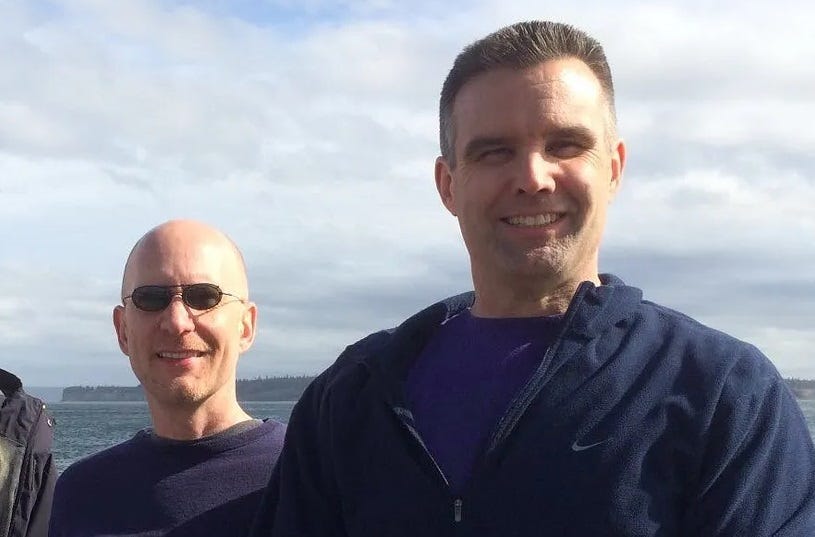How to Build a Life
It's harder — and easier — than it seems.
For the audio version of this article, read by the author, go here.

I’m proud of the fact that I have a very diverse group of friends, and in returning to the U.S. for my father’s funeral, I’ve been lucky to visit many of them in the lazy days of summer.
While Michael was visiting his brother in Colorado, I stayed in Washington and visited my friend Scott, who recently retired after thirty years in law enforcement. Scott and his wife live in a new house in the exurbs. The grass is clipped, the deck is composite, and the TV is very large. In the massive garage, everything is neat and perfectly in place.
My friend and his wife shop at Costco, vacation in Hawaii, and have frequent barbecues in the backyard with their friends, who tend to have blue collar jobs like theirs.
Scott is much more than the stereotype of the exurban homeowner. But the fact is, he does fit some of the stereotypes — just like Michael and I fit a lot of the stereotypes of the typical nomad.
After staying with Scott and his wife, I dipped down into Oregon to stay with my friend Arial, who lives in a large house built in 1918, right in the old town of the city center. The structure is a bit creaky, and things can be cluttered, but the old finishes are fantastic, and the patio Arial recently built out back is made from pieces of broken travertine limestone, which a neighbor abandoned and Arial reclaimed. The yard will soon be lawn-free, and the landscaping is shabby but lush, with lots of bees and butterflies.
This friend of mine shops at the local co-op, and everything in her house is organic, recycled, and composted. For many years, Arial refused to own a television, but she finally bought a small one, even if I never saw it turned on.
She’s now divorced and polyamorous, and lives with her adult son and non-binary housemate, and she has barbecues too, with her many polyamorous, non-binary friends, and there’s always a great vegetarian option.
Arial is also much more than a stereotype, but, well, she too fits some of the stereotypes of people like her.
Scott and Arial have never met, and if they did, I know they’d disagree on politics, but I suspect they’d still like each other, because they’re both so fundamentally decent — the kind of people who always welcome their visiting nomad friend with open arms.
And they’re both whip-smart, so I always enjoy hearing their takes on current events.
One of the best parts of both visits was seeing how content both Scott and Arial seem with the lives they’ve built for themselves.
Scott and Arial obviously lead very different lives, but the way they both got to where they are now is similar — and yet also different.
I met Scott in middle school. He grew up poor, one of four children of an overwhelmed single mother, who, after her divorce, survived for a time on government assistance.
Scott didn’t go to college and started working in high school. A few years later, when he told me he wanted to become a state patrol officer, I wasn’t surprised. He liked structure — and, more than anything, he wanted to make some real money for the first time since his biological father had left the family in a lurch.
I also wasn’t surprised when he excelled at his job, soon making detective and working in forensics. He rose ever higher in law enforcement, eventually landing in instruction and supervision. When he retired, he oversaw a staff of a hundred.
At the same time, he’s been very single-minded, setting goals and working hard to achieve them. He’s been incredibly thrifty over the years, and if he’s comfortable now, it’s because he worked his ass off for the forty-plus years I’ve known him.
By contrast, Arial grew up in a wealthy family, the daughter of a doctor, and if her childhood was more stable than Scott’s, her adult life has been more chaotic — more meandering, much less planned out. I met her in college, where she accidentally got pregnant. She gave that baby up for adoption, but ended up marrying the father a few years later, and they had two more kids.
But it was a troubled marriage that eventually ended in divorce.
When Arial told me she was polyamorous, it surprised me even less than when Scott told me he was going into the state patrol. At the time, almost fifteen ago, I was barely familiar with the concept, but once Arial explained it to me, it made perfect sense, given the person I knew her to be.

Arial has always had trouble staying motivated, and her personal life has been fairly rocky, but somehow this forced her to find a strange kind of self-reliance. She eventually made a nice career for herself. And two weeks ago, when I visited her in Oregon, I confess to being somewhat shocked — but very impressed — by all the work she had single-handedly done on her old house.
More than anything, I was thrilled to see that both Scott and Arial seem truly happy with the lives they’ve created for themselves.
I look at all my close friends, and I confess to being struck by how often their lives really do seem to be almost perfect reflections of their ambitions, values, and priorities.

Of course, some people end up in unhappy, unsatisfied lives through no fault of their own. And even when it is a person’s “fault,” it still sucks.
Most of our lives don’t go exactly as planned. Even Scott went through an earlier divorce.
Seven years ago, Michael and I had a home in Seattle and a nice circle of friends. I had a great marriage and a modestly successful writing career. I thought of myself as “happy,” but I was frustrated by the ups and downs of a career in the arts — which can really do a number on a person — and I was upset by the political situation in America.
So Michael and I decided to become nomads. We sold our house and left America to travel the world.
I hoped to like the traveling, and I truly have. What I didn’t expect was how the experience would shift my own priorities. I used to live for my career, but — because I work in the arts — my degree of success was essentially out of my control.
Looking back, I see how that was a recipe for frustration.
As a nomad, my life has become much richer and more varied, so my writing career seems like a smaller part of who I am — and “success” now seems much less important. I suspect this also has to do with my getting older.
And — irony of ironies — by starting this travel newsletter, I also found a kind of consistent writing success that had long eluded me.
The point is, it took some time, but I also finally built a life that really works for me.
Scott, Arial, and I all lead different lives. I suspect each of us would be unhappy if we were forced to switch places.
But eventually, we built great lives.
What was the key?
In all our cases, it was some degree of luck and good fortune.
But in Scott’s case, it was also about setting goals and perseverance.
In Arial’s case, it was the realization that she was on her own — that if she didn’t create focus in the fog of her life, no one would.
And in my case, it was a willingness to radically shake things up.
My dad died a little over a month ago, and since then, I’ve realized there’s very little you can say about life and death that hasn’t been said before.
But some things are worth saying again — like the fact that while some parts of life are surely random, not everything is.
In the end, I think our lives are, in large part, what we make of them. And even if they’re not, I’m really glad my friends and I have at least acted like they are.
Brent Hartinger is a screenwriter and author. Check out my new newsletter about my books and movies at BrentHartinger.com.




A thousand yeses to having a diverse group of friends, and valuing them as they are. And it's hard to get that perspective from living in a bubble, whether we're talking Lubbock or Brooklyn. Thanks for the insights you give that come from *your* way of living.
I like the quiet wisdom of this piece. Thank you.